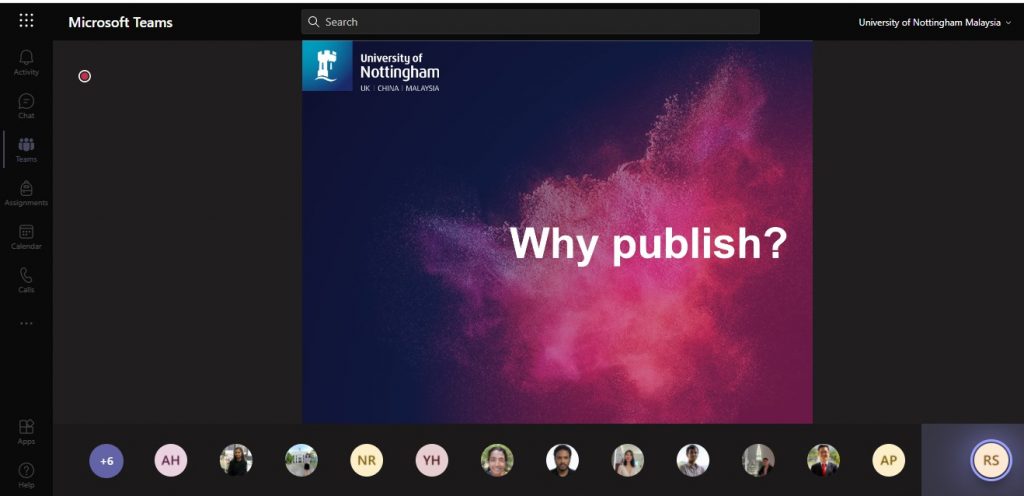
April 23, 2021, by Lisa Chin
Getting published and making an impact
This is why you should consider publishing your research
It is a well-known fact that academic publishing is irrevocably important. In addition to the provision of gap-spotting problematisation, innovative argument, revolutionary finding and evidence, astute analysis and so on, it is unequivocally one of the key criteria for performance review and promotion evaluation, institutional audit and national league standing. In the current higher education landscape, academic identities and their institutions are undoubtedly made in and through publication.
Delving into the topic of getting published
In retrospect, understanding the importance of publishing during postgraduate studies is somewhat unclear. Thus, we hosted a virtual session exploring academic writing and publishing as well as navigating the publication process on Tuesday 20 April 2021. This session provided a platform for postgraduate students, in particular postgraduate research (PGR) students, to have the opportunity to look at the journey of a scientific paper, best practices, techniques and strategies on how to publish effectively in high impact journals. The session was full of hints and tips, drawn from the convenors’ experiences as both authors and editor.
The session examined how postgraduate students can engage with the publication topography and get started on the right foot with publishing. The session was convened by Dr Revathy Sankaran, Research Training Development Assistant Manager at the Graduate School. Professor Ir Ts Dr Show Pau-Loke joined as co-convenor and shared some unwritten rules of academic publishing. Almost 30 of our postgraduate students tuned in to the two-hour session via MS Teams.
All about academic writing and publishing
Apart from the reiteration of the importance of academic publishing, with particular reference to academia, the session covered a wide range of details delving into the burning question of how to get published.
Dr Sankaran first gave a comprehensive presentation which offered a walk-through of almost everything there is to know about writing and publishing processes. She also shared some strategies and best practices in publishing as well as journal selection, with particular emphasis on publishing during PhD. In sharing some of her top tips on how to construct a good paper, Dr Sankaran gave this key advice: “Create a memorable and impactful title that can ‘sell’ and is enticing and engaging. Then you need to write a brief yet effective (snappy) abstract.” Another top tip that was highlighted, “Read and follow the author guidelines,” said Dr Sankaran as what seems like common sense is not common practice, or rather easy to be overlooked.
Drawing on his substantial background and extensive experience of publishing more than 400 high impact papers in less than 8 years, Prof Show continued on with an insightful presentation which revolved around the 5W1H (What, Why, Where, Who and How) questioning framework. Through it, Prof Show unpacked some of the hidden rules about academic publishing in the perspective of an editor and further shared some practical strategies that can be applied to increase your chances of getting published. In addition to authorship and acknowledgement, Prof Show also demystified the elements and differences between top and low journals. He further echoed the top tip shared by Dr Sankaran by reiterating the importance of reading and understanding the Guide for Author (GFA). “Choose the right journal to target before you write your paper,” added Prof Show. “Get the right research team to do cutting edge research and get good publications,” advised Prof Show as a take-home message.
The session was later opened for Q&A and one of the questions posted in real time by one of the attendees, which we want to highlight here, was “Would you suggest to publish your first paper in a low impact factor journal first? Or should we be aiming for high impact factor journals straight away?” In addressing this question, Prof Show encouraged to always aim for high impact factor journals, but of course a caveat, it is subject to supervisor’s advice and recommendation. Publishing in top journals is a challenge for everyone, although it may seem easier for some people. Not everything will succeed. Your paper may be rejected but yet, those who take no chance at all will surely not get anywhere. So try and try again. “Don’t put too much pressure on yourself and remember, it takes time and effort to publish,” said Prof Show.
Summing up and acknowledgement
We received a substantial amount of appreciation messages from the attendees. We hope the session was helpful for our postgraduate students in gaining knowledge and insights into the world of academic publishing.
Special thanks to Prof Show for his time and sharing of valuable insights.
For any enquiries or more information, please contact us at graduateschool@nottingham.edu.my.
-
Post a comment

